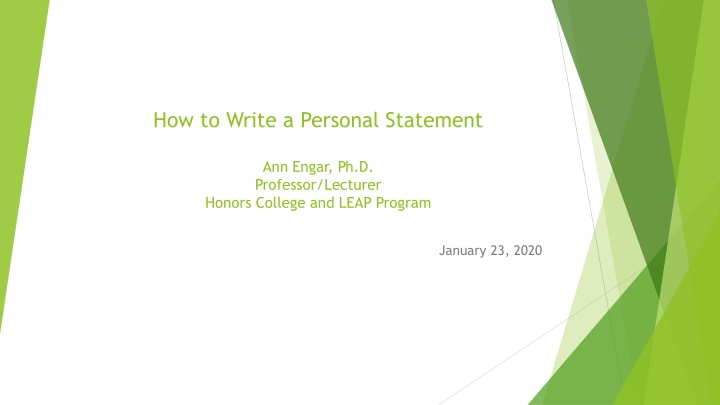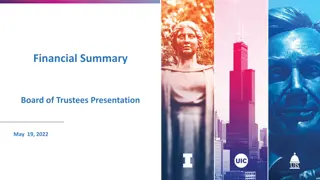
Mastering Your Personal Statement Writing Process
Learn how to craft a compelling personal statement for your college or job application. Understand the purpose, audience, and content requirements to make your statement stand out. Get tips on choosing a topic and writing effectively.
Download Presentation

Please find below an Image/Link to download the presentation.
The content on the website is provided AS IS for your information and personal use only. It may not be sold, licensed, or shared on other websites without obtaining consent from the author. If you encounter any issues during the download, it is possible that the publisher has removed the file from their server.
You are allowed to download the files provided on this website for personal or commercial use, subject to the condition that they are used lawfully. All files are the property of their respective owners.
The content on the website is provided AS IS for your information and personal use only. It may not be sold, licensed, or shared on other websites without obtaining consent from the author.
E N D
Presentation Transcript
How to Write a Personal Statement Ann Engar, Ph.D. Professor/Lecturer Honors College and LEAP Program January 23, 2020
WHAT IS A PERSONAL STATEMENT? 1. It is not a summary of your resume or a transcript. 2. It gives information to the reader about your background, experiences, and character. 3. It is often two pages long but always check and double-check the instructions (font size, spacing, margins). 4. It is a way to distinguish yourself from other applicants. 5. It demonstrates your writing ability, commitment, values, and professionalism.
WHO IS YOUR AUDIENCE? Someone who will read many--hundreds or even thousands of--personal statements. Someone who knows much more about medicine, law, or your field than you do. Someone who wants honest, non-gimmicky, sincere writing.
WHAT WILL YOU WRITE ABOUT? Some schools and organizations will provide you with a specific prompt. Be sure to read it carefully many times and answer it completely. Sample prompts: 1. What significant personal, social, or academic experiences have contributed to your decision to apply to medical school? 2. Please provide the Admissions Committee with information regarding such matters as personal, family, or educational background, experience and talents of special interest, one s reasons for applying as they may relate to the personal goals and professional expectations, or any other factors that you think should inform the Committee s evaluation of your candidacy for admission. 3. Write about a course, academic project, book, or artistic or cultural experience that has been important to you. 4. When did you become interested in this field, and what have you learned about it (and yourself) that has further stimulated your interest and reinforced your conviction that you are well suited to this field? What insights have you gained?
GENERAL PROMPTS Some prompts are less specific: 1. Write a personal statement. 2. Tell the admissions committee anything that might help it make its decision. 3. Explain why you re applying to law school (medical school, this scholarship, this graduate school). 4. Describe how you would add to the diversity of the incoming class.
LEAP PROMPTS You must demonstrate through your personal statement and/or resume how you will promote the advancement of STEM in Minorities or your interest in supporting underrepresented groups in STEM. Be sure to show how you can demonstrate Academic Promise in your personal statement. Be sure to include how you have demonstrated leadership among your peers while attending the university.
HOW DO YOU COME UP WITH A TOPIC IF NONE IS GIVEN? Have a friend or a colleague do a mock interview with you regarding why you are interested in applying. Ask your professor, coach, advisor, or parents friends what they think makes you special. Review all pivotal or remarkable experiences you have had in your life. How have these experiences directed your life and your decision to apply? Describe any volunteer experience or cause that has been of great importance to you. Think about a mentor or experience, book or quotation that has changed the direction of your life. Consider the goals and ideals that led you to seek a leadership role in clubs, sports teams, or work.
WHAT ARE SOME TOPICS ON WHICH YOU CAN WRITE PRACTICE ESSAYS? 1. What do you see as your future? Who will you be in ten years? 2. What is your strongest attribute? 3. What makes you different? 4. What is the worst thing that ever happened to you? What was the worst moment in your life? 5. Where does your ambition come from? 6. What do you care passionately about? How have you demonstrated this concern? 7. What adversities have you encountered in life? What perspective did you gain as a result? 8. In what college class did you make a special contribution? What made that contribution special?
WHAT ARE BAD TOPICS? Reasons you want a law, medical, or graduate degree if the prompt did not specify this topic (they would have asked directly if they wanted to know). A list of accomplishments (use one aspect but focus on you as a person). Experiences or thoughts that are really about someone else. Abstract ideas or theories (tell your story). Trips to Europe, Nepal, and the Amazon. Passion for fighting poverty and oppression (only if you have a multi-year track record in working for the public interest).
HOW SHOULD YOU WRITE AND ORGANIZE THE ACTUAL STATEMENT? THE INTRODUCTION IS THE MOST IMPORTANT PART. You want to hook your reader in the first sentence. Tell a story. Use a quotation (one not too famous or overused). Ask a question that your personal statement will answer. Describe a scene.
WOULD YOU WANT TO READ THE REST OF THESE PERSONAL STATEMENTS? 1. When I was ten years old, I had a feisty pony named Merrylegs. 2. For two years I have been a Peace Corps volunteer in the Republic of Niger in West Africa. 3. I am an extremely goal-oriented individual. 4. She said she was going on a business trip. 5. When I applied to college, football defined me to such an extent that I only considered schools where I thought I would be able to play. 6. It was called shock therapy. 7. About three years ago, a frightful brush with a libel suit rekindled my long- dormant desire to be a lawyer. 8. I recently got out of a toxic relationship.
CHARACTERISTICS TO EMPHASIZE Whatever you decide to do, build your Credibility Character Likeability Authority Ethos
DO YOU NEED A THESIS? WHAT KIND OF STRUCTURE SHOULD YOU HAVE? YES, you need a THESIS to guide yourself and your reader through the essay. You should be able to tell someone else how your statement is structured, what its logical progression is. It should be roughly six to ten paragraphs. Standard structures include A personal narrative or story. It should have a clear ending and explicit lesson. It should illustrate aspects of your character and leadership skills. Chronological growth. Avoid long narratives about your life before college. If you have a good reason for mentioning childhood or adolescent experiences, keep them short. A problem and the way you solved it. This structure emphasizes analytical reasoning. A metaphor or analogy that helps the audience understand you. This structure emphasizes rhetorical control.
WHAT WRITING STYLE AND TECHNIQUES SHOULD YOU USE? 1. Use vivid language. Avoid variations of the be verb and choose active, specific words (make sure you are aware of their meaning and connotations). 2. Appeal to the senses. Use words that help readers see, smell, feel, and hear the scene. Create dialogue. 3. Use similes, metaphors, and analogies to deepen the reader s understanding of your ideas. 4. Be upbeat. You can write about dealing with adversity but make your ultimate message positive. Do not whine or try cheap ploys for sympathy. Show perseverance, determination, and optimism. Do not be negative about a particular viewpoint or people who do not share your beliefs. 5. Sound professional. Edit language that sounds immature or generational. Avoid hyperbole and exclamation points. 6. Back up your claims with specific evidence.
HOW SHOULD YOU END YOUR PERSONAL STATEMENT? Complete the logical pattern that your essay has been developing. Rephrase or reassert your thesis. Return to the theme, question, or image in the opening paragraph so that the essay is rounded out. Use a twist or unexpected turn of thought. State your aspirations. Re-emphasize characteristics that show your ability to succeed.
WHAT FINAL STEPS SHOULD YOU TAKE? Always explain without excuses any discrepancies or problems in your academic or personal record. Proofread your essay multiple times. Let the first draft of the essay sit for several days or a week before returning to it with a fresh eye. Have friends, family members, colleagues, and others read your statement.
SOURCES Curry, Boykin. Essays That Worked for Law Schools. Westminster, MD: Ballantine Books, 2003. Estrich, Susan. How to Get into Law School. New York: Riverhead Books, 2004. Ivey, Anna. The Ivey Guide to Law School Admissions. Orlando, FL: Harcourt, Inc., 2006. Montauk, Richard. How to Get into the Top Law Schools. 4thed. New York: Prentice Hall, 2008. Owen, Eric and the Staff of Princeton Review. Law School Essays That Made a Difference. New York: The Princeton Review, 2008. The Writing Lab & The OWL at Purdue and Purdue University. Writing the Personal Statement. 2018. https:owl.purdue.edu/owl






















